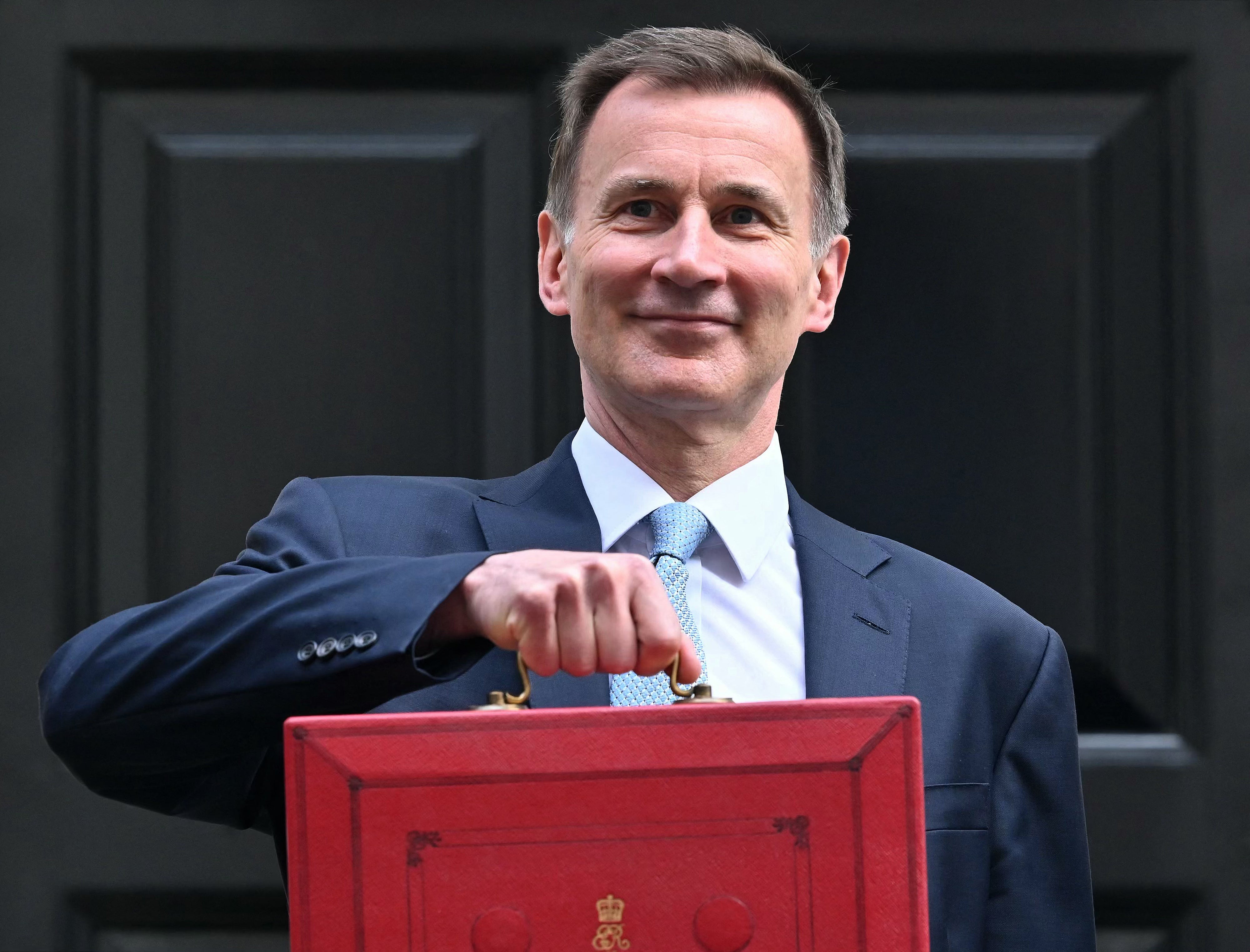Every April, British households face big changes as the UK enters a new financial year.
Following Chancellor Jeremy Hunt’s Spring Budget, April 2024 will be no different, with a number of new measures and rates set to come into effect.
In April, various income sources will increase, while household bills are expected to start to level off to more sustainable levels than in recent years.
Inflation took a positive turn in March, falling to 3.4%, the lowest level since March 2021. Combined with strong wage growth over the summer, the UK economy may be showing early signs of growth.
However, the cost of living crisis continues, with many households still struggling to afford necessities and saddled with record levels of debt from the past few years. Inflation has also fallen short of the Bank of England’s 2% target.

Jeremy Hunt poses with red budget box, March 6, 2024
(AFP via Getty Images)
To help you cope with the financial circumstances UK households are facing this year, here’s a guide to the five biggest changes that could affect your finances in April:
National Insurance cut by 2p
As part of the Spring Budget, Mr Hunt announced a 2p cut to National Insurance (NI) contributions, effective from 6 April. This brings their share down to 8%, following another 2p cut (to 10%) in January.
This means that most workers (those earning more than £242 a week) now pay 4% less NI tax.
However, several economic think tanks pointed out that many workers have actually become worse off due to the freezing of personal income tax thresholds implemented in April 2021.
That’s because, as people’s wages rise with inflation, the point at which they start paying taxes (or higher tax rates) doesn’t rise as much as it normally does. Economists call this a “fiscal drag.”
Under the new changes, someone earning £25,000 a year will save £41.43 from the National Insurance changes. However, they will pay £62.08 more per month than when the tax threshold was raised in line with inflation from April 2021. A total loss of £20.65.
Things get better after £32,000. Someone on this salary will save £64.77 through NI cuts and pay £62.06 more after the financial drag. This means they can take home an extra £2.71 a month.
Someone earning £56,000 will start to make a net loss again, because while they will save £125.67 from the NI cuts, they will lose £128.91 after the financial drag. This is a net loss of £3.24.
Benefits, pensions and the minimum wage are all rising
Each year, benefits increase at least in line with inflation, usually taken from the previous September’s inflation rate. This means benefits will increase by 6.7% in April.
In 2024/25 standard Universal Credit allowance will increase to:
- £311.68 per month Suitable for singles under 25 (from £292.11)
- £393.45 per month Suitable for singles aged 25 and over (from £368.74)
- £489.23 per month Joint claimants all aged under 25 (original price £458.51)
- £617.60 per month Available to joint claimants aged 25 and over (original price £578.82)
Also rising are the basic pension and the new state pension, which will increase by 8.5% in April. This is in line with last year’s average earnings growth, based on the triple lock guarantee. This is the second largest ever increase in state pension levels.
The new state pension tax rate for 2024/25 will be:
- £221.20 per week New State Pension (original price £203.85)
- £169.50 per week Basic state pension (from £156.20)
The minimum wage for people aged 21 and over will also rise by 9.8% in April to a new £11.44. The £1.02 an hour rise is the largest ever cash increase to the minimum wage.
For those under 21 years of age, the rates for 2024/25 are:
- £8.60 per hour Suitable for people aged 18-20 years old
- £6.40 per hour Suitable for 16-17 year olds
- £6.40 per hour for apprentices
Council tax rises more than usual
As councils across the country face financial difficulties, many are preparing to increase residents’ council rates to the maximum amount allowed.
For councils with social care responsibilities, the figure is 4.99% and 2.99% for other councils. Research from the County Councils Network shows the vast majority of people choose to meet the caps.
But some go further. Birmingham City Council has been given the go-ahead to increase council tax by 21% over the next two years. House prices in Woking will rise by 10 per cent, while Thurrock and Slough will both rise by 8 per cent.
In recent years, all of these councils have served Section 114 notices on the government, declaring themselves effectively bankrupt.
According to government figures, average annual tax bills will rise by £106. For a complete breakdown of the council, independent Made a useful map.
Energy bills fall, water bills rise
Household bills will be a mixed bag this April, but should be cheaper overall for the average household.
Ofgem’s energy price cap will fall by £238 from April to June to £1,690, the lowest level in two years. This number represents the average amount a household can expect to pay for “typical” energy consumption.
Analysts at trusted Cornwall Insight predict the figure will fall a further £228 to £1,462 in July.
Water bills are going in the opposite direction, with an average rise of 6% expected, adding £28 a year to the typical water bill.
However, there are significant regional differences. Wessex Water customers will see the biggest increase of £59 a year, while most of Wales will actually see a £20 a year reduction.
Broadband, mobile and pay TV costs are rising
Pay TV, broadband and mobile prices will rise by up to 8.8% this spring, with most providers adjusting from 1 April. This varies from provider to provider, so you’ll need to contact your provider directly.
Unfortunately, if you’re on a fixed-term contract, the provider can increase the rates you pay while you’re still locked in. This means that even if you don’t agree to the price increase, you may have to pay a break fee to leave the contract.
In more bad news for TV owners, the annual TV license fee will also rise from £159 to £169.50 from 1 April. This ends a two-year fee freeze, so TV license fees are expected to rise further. future.
Follow us on Google news ,Twitter , and Join Whatsapp Group of thelocalreport.in
















